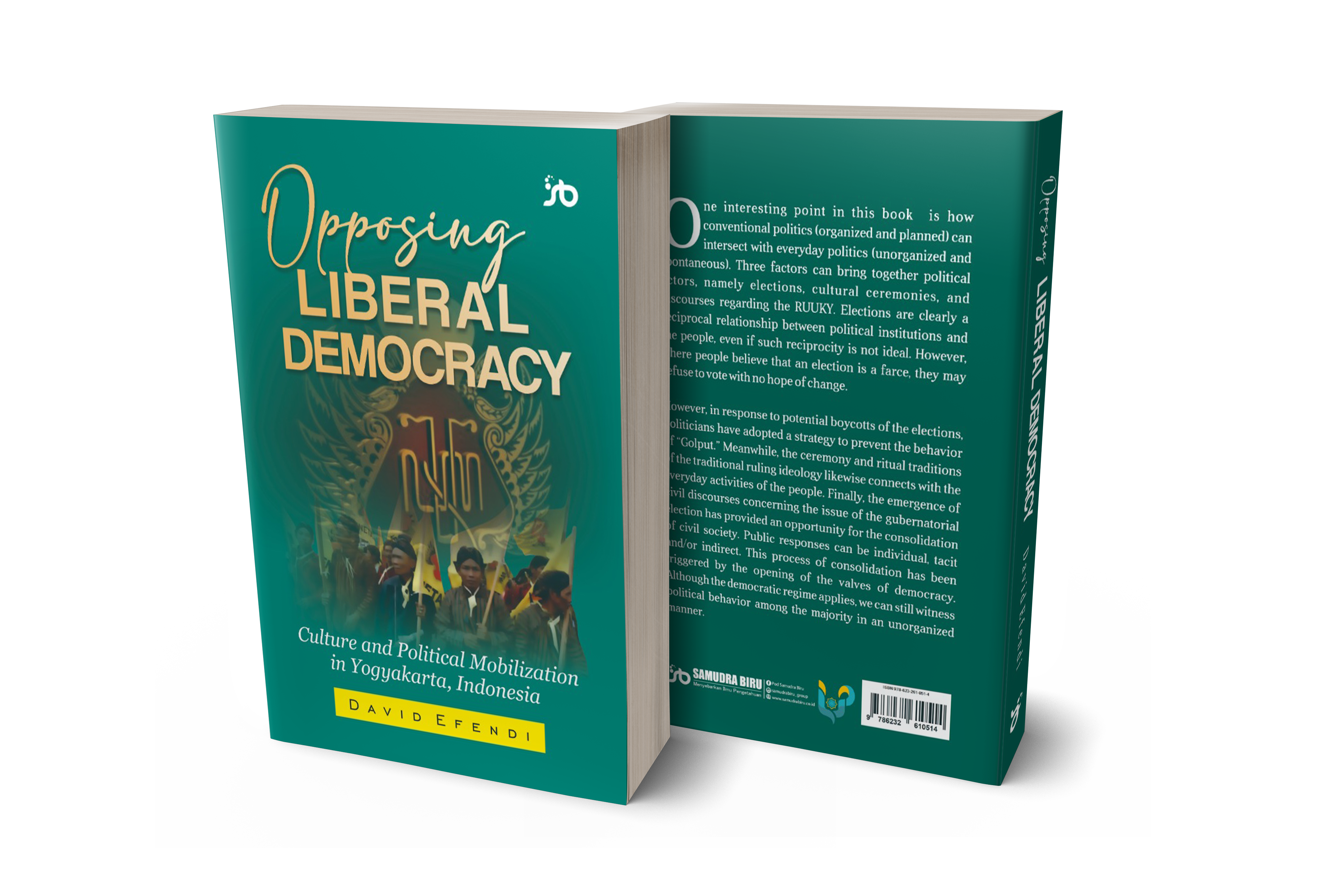Opposing Liberal Democracy: Culture and Political Mobilization in Yogyakarta, Indonesia
A book that describes the process of rejecting local communities in Yogyakarta against the central government’s proposal for gubernatorial elections.

Opposing Liberal Democracy: Culture and Political Mobilization in Yogyakarta, Indonesia
I have been blessed with a great opportunity, and I deeply owe a debt of gratitude to the people of Yogyakarta who have inspired me to study local and grassroots politics. Yogyakarta, as the center of Javanese culture, was an ideal location to study everyday politics, and the creativity of the people of Yogyakarta impressed me during my field research.
Goverment in Yogyakarta
The movement against the Dutch in Yogyakarta is a manifestation of Javanese ideology called “Manunggaling Kawulo lan Gusti,” meaning the people and the King aer united. It was inspiring for me to learn more about the recent movement in Yogyakarta under the banner of defending the special status of this region as part of the decentralization and democratization project led by the central government.
The Pisowanan Agung (The Great Mass Gathering), which was attended by millions of Yogyakartans in 1998, clearly showed the solidarity of the people and the King. Suharto was born in Yogyakarta, but people of this region were demanding for him to step down. People power grew out of grassroots politics and was transformed into a social movement and collective protests.
Transition Period
After the fall of the new order regime in 1998, a third wave of democracy and “liberalization” spread across almost all regions of Indonesia, including the monarchial province of Yogyakarta. This political reform or reformasi led to the current so-called transition period.
It remains to be seen whether this transition period will be democratic or not. This situation has been interpreted as a basis for instituting direct general elections under Law 22/1999, the promulgation of which was followed by a variety of political scandals for the local elections involving both national and local actors.
The Era Of Liberal democracy
In the liberalized political system, it seems that anyone with money can win positions in the central, provincial, or local government. As Hadiz (2010) and Hidayat (2009) argue, social capital, networks, and money each play important roles in political competition and liberal democracy in Indonesia.
Liberal democracy has become a serious problem after 12 years of reform in Indonesia. The big bang of decentralization with the direct elections led to the emergence of a mafia, local strongmen, predatory elites, and patron-client behavior as elements of everyday life. As a result, corruption has spread rapidly nationwide, giving rise to the question: has liberal democracy in Indonesia failed after the decade-long reform era?
Actually, this has re-emerged as a topic of public discussion since, in 1950, Indonesia experienced its first failure with liberal democracy (Legge 1964, Kahin 1964, Faith 1967, Dwipayana 2011), which led to Sukarno’s guided democracy. Global scandals toppled the totalitarian regime and replaced it with economic liberalization and restriction of political space. After 32 years, the economic crisis in Asia ignited political revolution and ended with the fall of the dictatorship on May 20, 1998, initiated by movements of students, union workers, and other elements of civil society.
Reaction To The New Order
During the course of this transition period, different political entities have responded in different ways. Politicians, civil society organizations, and grass root communities, of course, they have their own opinions in an atmosphere of political uncertainty.
In the case of Yogyakarta, some of them have reacted to the New Order by demanding more democratic states and more decentralized regions, while others want to preserve traditional and charismatic leader of Yogyakarta, and yet others talk about better prosperity, more peaceful conditions, and increased job opportunities instead of democracy and participation.
It means that there some political dynamic in this region concerning locality, respect to charismatic leader (The Sultan) by employing social movement model and interestingly most of population still continue their everyday politics in this democratic feature.
Also, they come together in some sites of social, economy, and political interaction so we may say that either formal politics/conventional politics, advocacy politics and “everyday politics” intersect one another (Kerkvliet, 2009).
(David Efendi in the introduction to his book)
Dapatkan Bukunya Sekarang Juga!
DAFTAR ISI
Bab 1
Introduction:
Local Politics, Local Identities, and Democratization (Introduction, Previous Studies on Local Politics, Theoretical Frameworks, Yogyakarta: Before and After the Suharto New Order, Rising Debate on Yogyakarta’s Politics, Research Methodology, Chapter Organizations)
Bab 2
Change and Continuity: Political Constraint in Post-Suharto Indonesia (Introduction, Local Versus National Politics, Yogyakarta Under The Post-Suharto Regime)
Bab 3
The Paguyuban Movement: An Opposition to ‘Liberal Democracy’, 2003-2012 (Introduction, Profiles of SMOs, The Implementization of Social Movement Theories, Strategies, and Tactics, and Motivation of the Movements, Conclusion)
Bab 4
Everyday Politics and Resistance: Understanding the ‘Hidden Transcript” of Jogjanese Communities (Introduction, The Concept of Power and Democracy in Everyday Lives in Yogyakarta, Understanding Everyday Politics in Yogyakarta’s Communities, Conclusion: The Power of Everyday Politics)
Bab 5
Conclusions and Directions for Further Study (Transitional Politics, Everyday politics and resistance, Intersection between Conventional and Everyday Politics, Directions For Future Research)
Spesifikasi Buku

Cetakan I Mei 2020; xxii + 224 hlm, ukuran 14 x 20 cm, kertas isi Bookpaper 57,5 gram hitam putih, kertas cover ivory 230 gram full colour, jilid lem panas (soft cover) dan shrink bungkus plastik.
Harga Buku
Sistem penjualan buku ini adalah print on demand. Buku hanya akan dicetak ketika ada pemesanan. Butuh waktu +- 3 hari setelah pembayaran. Harga belum termasuk ongkos kirim
Rp175.000
Rp160.000
Tentang Penulis

David Efendi
Lecturer at the Department of Governmental Science in Universitas Muhammadiyah Yogyakarta. He got MA from Gadjah Mada University and for his second master in political Science was from University of Hawaii at Manoa. He is doing his PhD in UGM. Another academic project, he is a head researcher at the center of Muhammadiyah Studies at UMY.